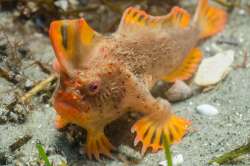New population of extremely rare 'walking fish' found in Tasmania
Red handfish use their pectoral fins in an unusual manner to walk slowly over the sea bottom in search of food.

A small population of fish that "walk" along the seabed have been discovered off Australia's south coast in Tasmania.
The Red Handfish (Thymichthys politus) is found only in southeastern Tasmania, an isolated island state, and until last week only about 20 to 40 of them were identified in the Frederick Henry Bay, the University of Tasmania said.
The new group also of 20 to 40 individuals, inhabits a small area whose location the researchers decided not to disclose until the conservation plan for the area was discussed, Efe news reported.
The first time the Red Handfish, whose size is between six and 13.5 cm long, was sighted was in the 19th century near Port Arthur, in Tasmania, one of the places on the planet which is home to rare and unique endangered species. The habitat of this second colony of handfish is small within a radius of 20 metres, because instead of swimming they walk on the seafloor.
The finding was made last week while the Institute for Marine and Antarctic Studies of the University of Tasmania was conducting a reef life survey, after the fish were spotted by a private individual. "Finding this second population is a huge relief as it effectively doubles how many we think are left on the planet," IMAS Scientist Rick Stuart-Smith said.
The researcher stressed that the new habitat is different from the first population, which would make the fish not completely dependent on local conditions. "We've already learned a lot from finding this second population because their habitat isn't identical to that of the first population, so we can take some heart from knowing red handfish are not as critically dependent on that particular set of local conditions," Stuart-Smith added.
The handfish have an elongated body and use their pectoral fins in an unusual manner to walk slowly over the sea bottom in search of food such as crustaceans and worms, the Australian Ministry of Environment said.
(With IANS inputs)
Keep watching our Facebook page for all updates